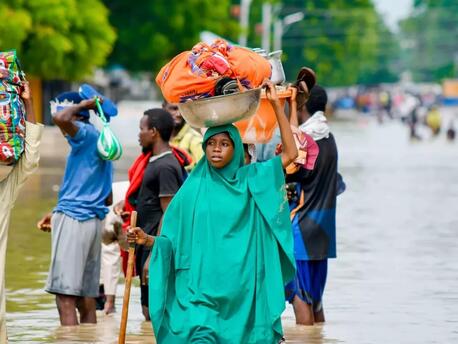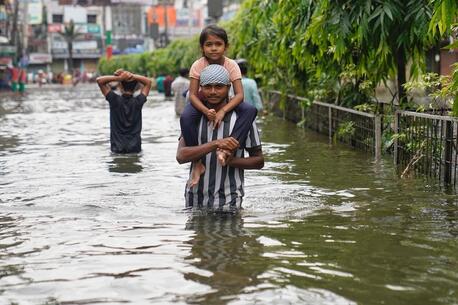Floods in Bangladesh: How UNICEF Is Delivering Relief & Protection to Children
Over 2 million people — including over 772,000 children — are feeling the effects of severe flooding in northeastern Bangladesh. UNICEF is there.
As floodwaters rise, children are the most vulnerable
Flooding in northeastern Bangladesh, the result of heavy monsoon rainfall, is affecting over 2 million people, UNICEF reported on Tuesday, June 25.
Much of the Sylhet district (75 percent), including over half the area's crops and paddy fields, are submerged, threatening livelihoods and food security.
Over 772,000 children are facing heightened risks of drowning, malnutrition, waterborne diseases and trauma from displacement related to the crisis.
“Our priority is to ensure the safety and well-being of children and adolescents," said Sheldon Yett, UNICEF Representative to Bangladesh, noting the risk of potential abuse in overcrowded shelters. “Child Protection Social Workers are offering support to mitigate potential violence and counseling to help children overcome trauma during this difficult time."
Water and sanitation infrastructure across the region has suffered major damage. Hundreds of schools were flooded. Dozens of child protection community hubs — UNICEF-supported facilities hosting a range of activities for children — were also flooded and partially damaged.
UNICEF has been working with the Government of Bangladesh and its many local partners to help mitigate health and safety risks. Relief measures include distributing safe water and other lifesaving supplies and helping to shore up health, social and protective services in flood-affected areas.
Social workers, counselors and volunteers are on the ground reaching children with psychosocial and other support.
UNICEF has also deployed frontline workers alongside hundreds of community facilitators and peer leaders to assist with service delivery and to disseminate information on how to stay healthy and safe. Sessions about drowning and snake bites have reached thousands of people.
Addressing urgent needs while strengthening disaster preparedness, disease prevention
On top of addressing immediate dangers and meeting urgent needs, UNICEF is also working to help strengthen the country's overall disaster preparedness and build resilience to future shocks. Meetings among various agencies are being organized to improve coordination and collaboration among emergency responders and key stakeholders and help ensure a comprehensive approach — to this response and those to come.
Bangladesh, already prone to flooding, has become increasingly vulnerable to extreme weather and related disasters linked to climate change.
Related: How UNICEF is responding to the climate crisis
Cases of acute watery diarrhea often spike during crises like these, where access to safe water, sanitation and hygiene is disrupted. UNICEF-supported medical teams have been deployed to shelters and communities to distribute oral rehydration salts and other medicines. UNICEF also supports public information campaigns focused on disease prevention.
As of June 25, UNICEF had reached over 230,000 people with jerry cans, water purification tablets and hygiene kits, and had helped deploy four mobile water treatment plants.
Learn more about what UNICEF is doing in Bangladesh for children and families in need.
UNICEF responds to hundreds of humanitarian emergencies every year. Support UNICEF's mission. Donate today.
HOW TO HELP
There are many ways to make a difference
War, famine, poverty, natural disasters — threats to the world's children keep coming. But UNICEF won't stop working to keep children healthy and safe.
UNICEF works in over 190 countries and territories — more places than any other children's organization. UNICEF has the world's largest humanitarian warehouse and, when disaster strikes, can get supplies almost anywhere within 72 hours. Constantly innovating, always advocating for a better world for children, UNICEF works to ensure that every child can grow up healthy, educated, protected and respected.
Would you like to help give all children the opportunity to reach their full potential? There are many ways to get involved.




